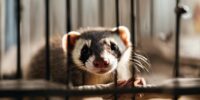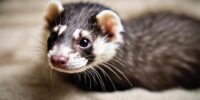What to Avoid in Ferret Cages: Hazardous Materials and Objects
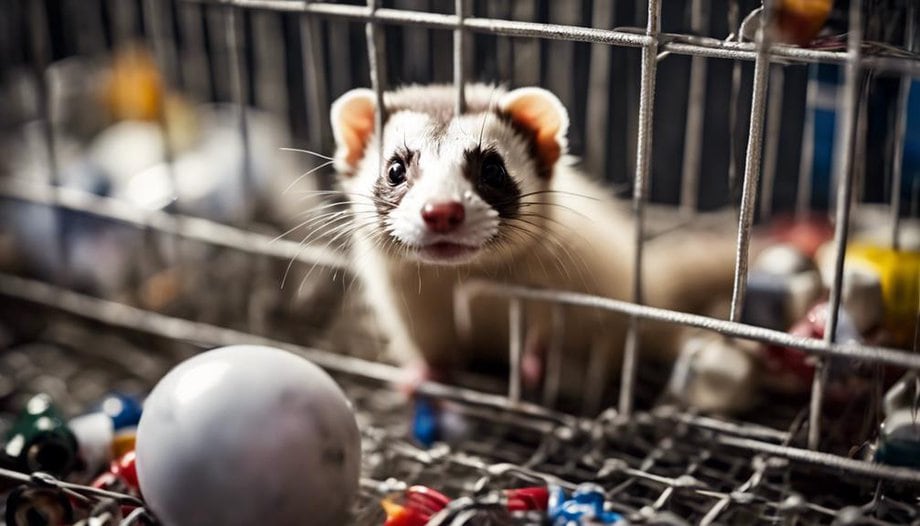
Avoiding hazardous materials and objects in your ferret's cage is crucial for their safety. Toxic bedding choices and hazardous chew toys can pose serious risks to your furry friends.
Learn what to steer clear of to ensure a safe and healthy environment for your playful ferrets.
Toxic Bedding Options
Choosing non-toxic bedding for your ferret's cage is crucial to ensure their safety and well-being. Safe bedding choices include paper-based products, such as recycled paper pellets or paper pulp bedding. These materials are free from harmful chemicals that could be present in other bedding options like cedar or pine shavings.
Additionally, proper ventilation techniques are essential to maintain a healthy environment within the cage. It's important to ensure that there's adequate airflow to prevent the buildup of ammonia from urine, which can be harmful to your ferret's respiratory system.
When selecting bedding for your ferret, opt for options that are dust-free and don't contain any artificial fragrances or dyes. These additives can irritate your ferret's sensitive respiratory system. Providing a clean and comfortable bedding environment is key to promoting your ferret's health and happiness.
Regularly cleaning and changing the bedding, along with implementing proper ventilation, will help create a safe and cozy space for your furry friend to thrive.
Sharp or Small Wire Mesh
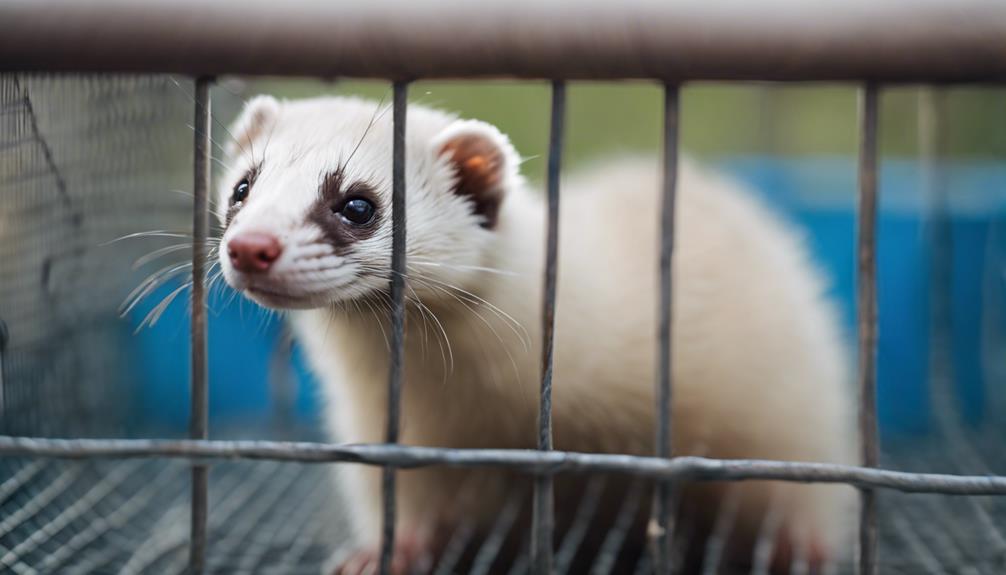
Ensuring your ferret's safety and comfort extends to the cage structure itself, where avoiding sharp or small wire mesh is crucial to prevent injuries or entrapment. When selecting a cage for your ferret, pay close attention to the wire spacing and avoid any materials that could potentially harm your furry friend.
Here are some reasons why sharp or small wire mesh should be avoided:
- Wire spacing: Incorrect wire spacing can lead to a ferret getting stuck or injured.
- Barbed wire: Sharp edges or barbed wire can cause cuts or scratches on your ferret's delicate skin.
- Mesh gaps: Small mesh gaps can pose a risk of entrapment for your ferret's paws or head.
- Sharp edges: Any sharp edges on the wire mesh could also result in injuries to your pet.
Unsafe Chew Toys
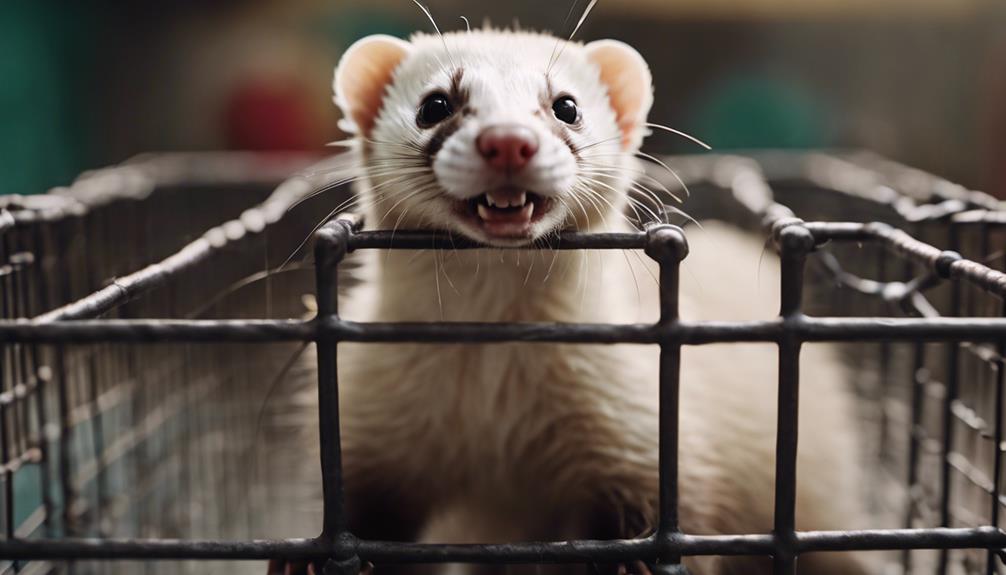
Many ferret owners might unknowingly introduce toxic chew toys into their pets' cages, posing a serious health risk. Additionally, items with small parts can present a hazard if they break off and are ingested.
Ferrets are curious creatures, making it crucial to avoid any toys that could potentially lead to choking incidents.
Toxic Chew Toys
To keep your ferret safe, always check for chew toys that may contain toxic materials. When selecting toys for your furry friend, it's important to be mindful of potential hazards. Here are some tips to help you choose safe chew toys:
- Opt for Safe Alternatives: Choose toys made from non-toxic materials like hard rubber or specific pet-safe plastics.
- Follow Chew Toy Guidelines: Avoid toys with small parts that could be ingested or materials that could splinter.
- Avoid Toys with Harmful Chemicals: Steer clear of toys treated with chemicals or dyes that could be harmful if chewed on.
- Regularly Inspect Toys: Check toys for wear and tear, discarding any that are broken or damaged to prevent accidental ingestion.
Small Parts Hazard
Checking for small parts in chew toys is crucial to prevent hazards for your ferret. Ferrets are curious animals that love to chew on things, but ingesting small parts can lead to serious health issues. When selecting chew toys for your ferret, ensure they are sturdy and do not contain any detachable pieces that could be swallowed. Below is a table outlining ferret proofing techniques and potential risks and solutions related to small parts hazards in chew toys:
| Ferret Proofing Techniques | Potential Risks | Solutions |
|---|---|---|
| Choose toys without small parts | Ingestion of small parts | Regularly inspect toys for damage |
| Opt for durable chew toys | Choking hazards | Remove any broken or loose parts immediately |
| Supervise playtime | Digestive blockages | Provide alternative safe chew toys |
Choking Risk Items
When selecting chew toys for your ferret, it's crucial to avoid items that pose a choking risk, such as those with detachable parts or small components that could be swallowed. To ensure your ferret's safety, consider the following:
- Opt for durable chew toys without small pieces that can break off.
- Avoid toys with bells or buttons that could come loose and be swallowed.
- Choose toys specifically designed for ferrets to reduce the risk of choking.
- Regularly inspect toys for signs of wear and tear to prevent accidental ingestion.
Chemical Cleaners
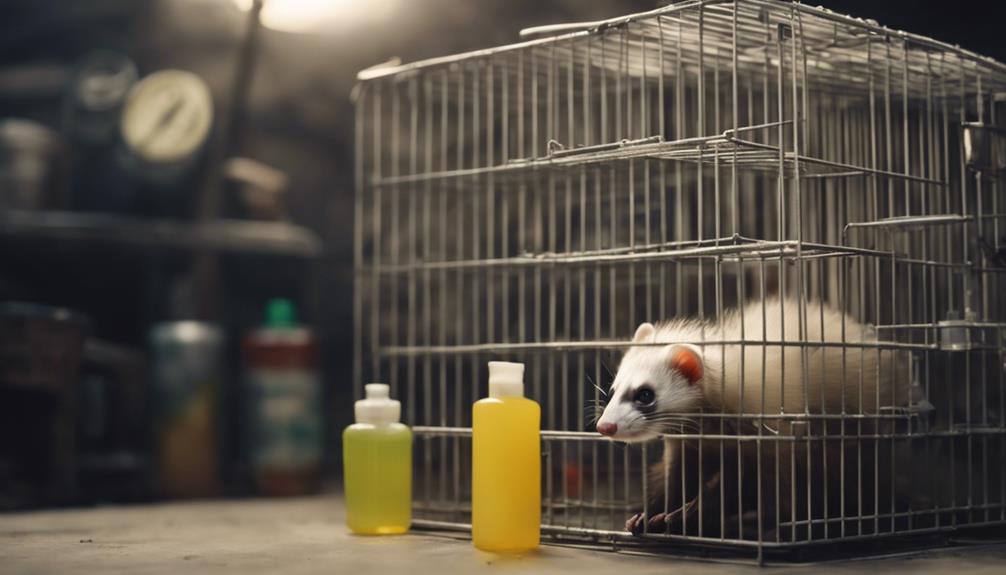
Chemical cleaners should be used cautiously in ferret cages to prevent potential harm to the ferrets. When cleaning the cage, it's vital to avoid products that emit harmful fumes or could cause skin irritation.
Ferrets have sensitive respiratory systems and skin, making them susceptible to the effects of harsh chemicals commonly found in cleaning agents. Opt for pet-safe, non-toxic cleaners to ensure the well-being of your furry companions. Vinegar diluted with water or specialized pet cage cleaners are safer alternatives to strong chemical solutions.
Before using any cleaner, read the labels carefully to check for any warnings or ingredients that could be harmful to ferrets. Even after cleaning, make sure the cage is thoroughly rinsed and dried to remove any residue that might be harmful to your pets.
Loose or Dangling Wires
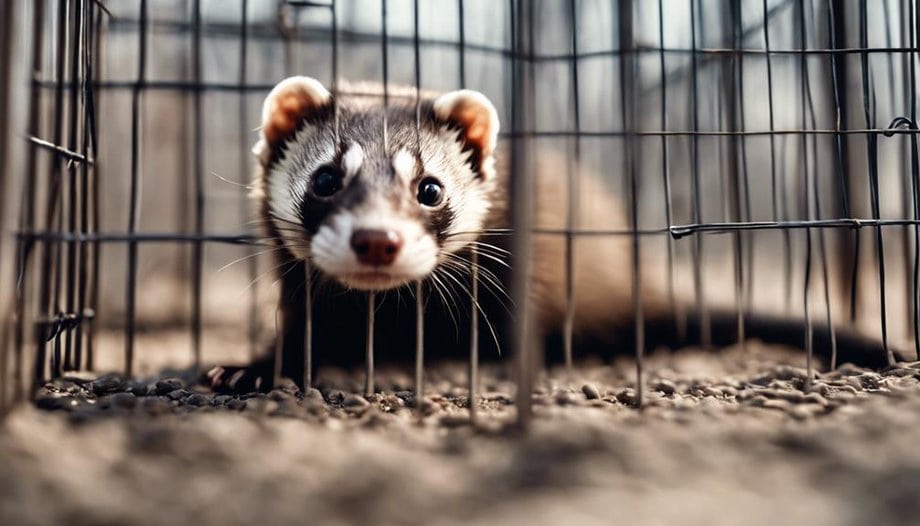
Ferrets are notorious for their tendency to chew on wires, posing a significant risk of injury or electrocution.
Loose electrical cords in a ferret cage can be particularly hazardous, leading to potential burns or electric shocks.
Additionally, tangled cables can create entrapment risks, potentially causing harm to the ferret.
Wire Chew Risk
To prevent wire chew hazards in ferret cages, regularly inspect for loose or dangling wires that could pose a risk to your pets. Ferrets are curious creatures known for their tendency to chew on objects, including wires, which can lead to serious injuries or even fatalities.
Here are some tips to help safeguard your ferrets:
- Secure wires: Use protective covers or tubing to prevent access.
- Provide alternatives: Offer chew toys and safe items for exploration.
- Utilize training techniques: Use positive reinforcement to discourage wire chewing.
- Consider deterrents: Bitter apple sprays or bitter-tasting solutions can help deter chewing behavior.
Electrical Cord Danger
Inspecting and securing electrical cords in ferret cages is essential to prevent hazards posed by loose or dangling wires. Ferrets are naturally curious and may chew on cords, risking electric shock or injury. To mitigate this danger, consider using outlet covers to prevent access to sockets and ensure all cords are safely concealed. Here is a table summarizing key points to remember when dealing with electrical cord safety in ferret cages:
| Safety Measure | Description | Importance |
|---|---|---|
| Outlet Cover | Block access to sockets | High |
| Cord Concealment | Hide cords out of reach | Essential |
Utilizing these precautions can help create a safer environment for your ferrets.
Cable Tangle Hazard
When setting up a ferret cage, ensuring cables are organized and free from tangles is crucial to prevent the risk of hazards associated with loose or dangling wires. To prevent entanglement and ensure the safety of your ferrets, consider the following cable management solutions and ferret proofing techniques:
- Use cable management clips or ties to secure wires along the cage walls.
- Invest in cord protectors to cover exposed wires and prevent chewing.
- Implement elevated cable runs or tunnels to keep wires out of reach.
- Regularly inspect cables for any signs of wear or damage.
Plastic Objects and Accessories
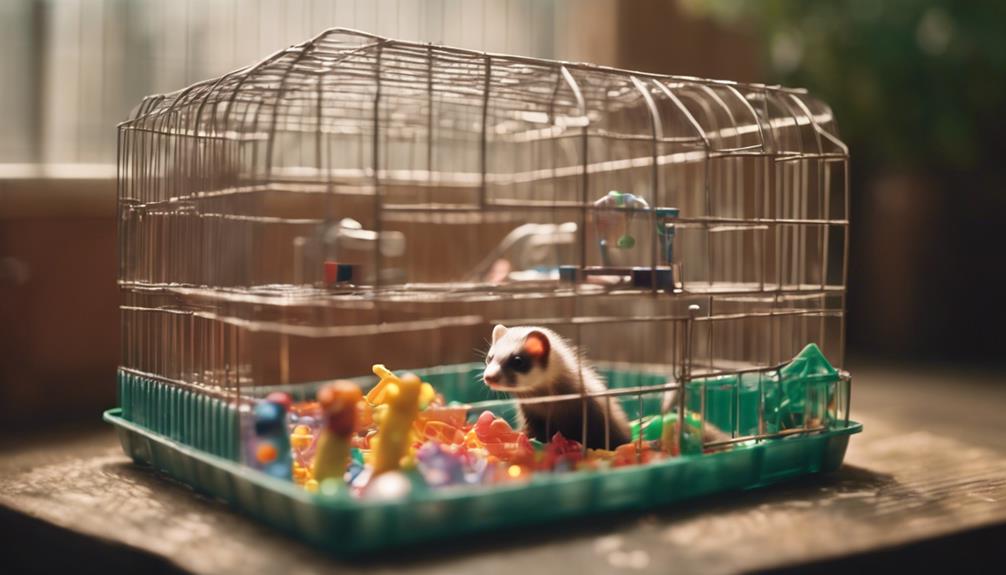
Plastic objects and accessories in ferret cages should be regularly checked for signs of wear or damage to ensure the safety of your pet. Ferrets are curious animals that may chew on or scratch plastic items, posing risks such as plastic toxicity and potential ingestion hazards. Opt for durable, non-toxic plastics to minimize these dangers.
Ventilation is crucial when selecting plastic accessories to prevent the buildup of odors or moisture that could harm your ferret's respiratory health. Ensure the materials used are safe for your pet in case they come into contact with them during play or rest.
Regularly inspect plastic toys, tunnels, and hideouts for any signs of damage like cracks, sharp edges, or loose parts that could be ingested. Replace any compromised items promptly. When cleaning plastic accessories, use pet-safe detergents and ensure thorough drying to prevent mold growth.
Excessive Clutter and Debris
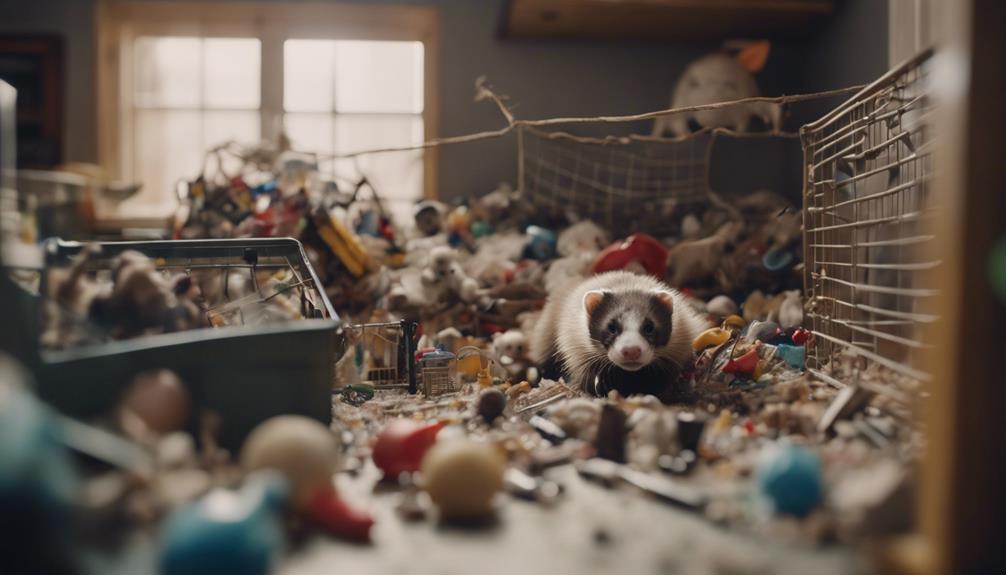
To ensure the safety and well-being of your ferret, it's essential to regularly clear out excessive clutter and debris from their cage. Proper clutter management and debris removal are crucial to creating a safe environment for your furry friend. Here are some reasons why maintaining a clutter-free cage is vital for your ferret:
- Prevents Accidents: Excessive clutter can lead to your ferret tripping or getting stuck, causing potential injuries.
- Promotes Cleanliness: Removing debris helps maintain a hygienic living space, reducing the risk of infections.
- Enhances Mental Stimulation: A clutter-free environment allows your ferret to move freely and engage in natural behaviors, promoting mental well-being.
- Improves Air Quality: Eliminating dust and debris can enhance air circulation within the cage, ensuring better respiratory health for your ferret.
Frequently Asked Questions
Can Ferrets Safely Play With Rubber Toys in Their Cage?
Ferrets can safely play with rubber toys in their cage, ensuring they are non-toxic and durable. However, avoid toys with small parts that can be ingested. Check for any damage regularly to prevent potential hazards from fraying or chewing on cage wires.
Is It Okay to Use Scented Bedding for Ferrets?
Using scented bedding for ferrets may pose risks of allergies or chemical reactions. It's advisable to avoid such bedding to prevent potential health issues. Opt for unscented bedding to ensure the safety and well-being of your ferret.
What Should I Do if My Ferret Chews on the Cage Wires?
If a ferret chews on cage wires, provide chew deterrents like bitter apple spray. Train them to avoid wire chewing by giving them appropriate toys and cage enrichment to combat boredom. Redirect their behavior with positive reinforcement.
Are There Any Specific Types of Plastic Objects That Are Safe for Ferrets?
When choosing plastic objects for ferrets, opt for durable and non-toxic materials. Plastic tunnels and chew toys are safe choices. Avoid items with small parts that can be chewed off. For metal bowls and hammocks, ensure they are securely attached.
How Often Should I Clean My Ferret's Cage to Prevent Hazards?
To maintain a healthy environment for ferrets, regular cage maintenance is essential. Cleaning frequency should be at least once a week to prevent health risks and control odors. A clean cage promotes the well-being of the ferret.




